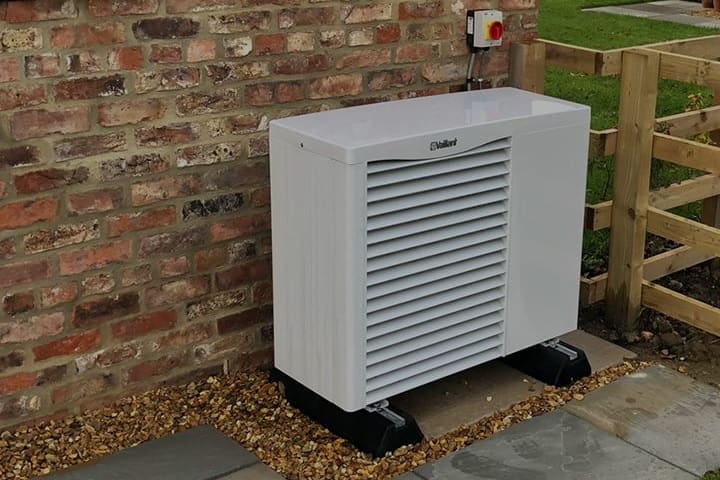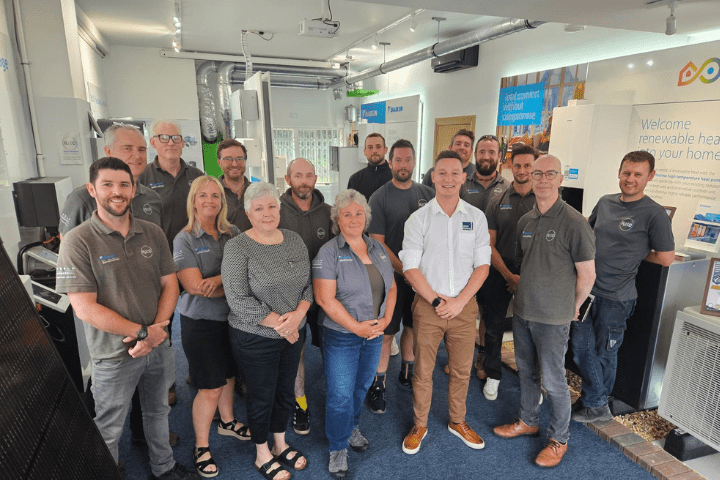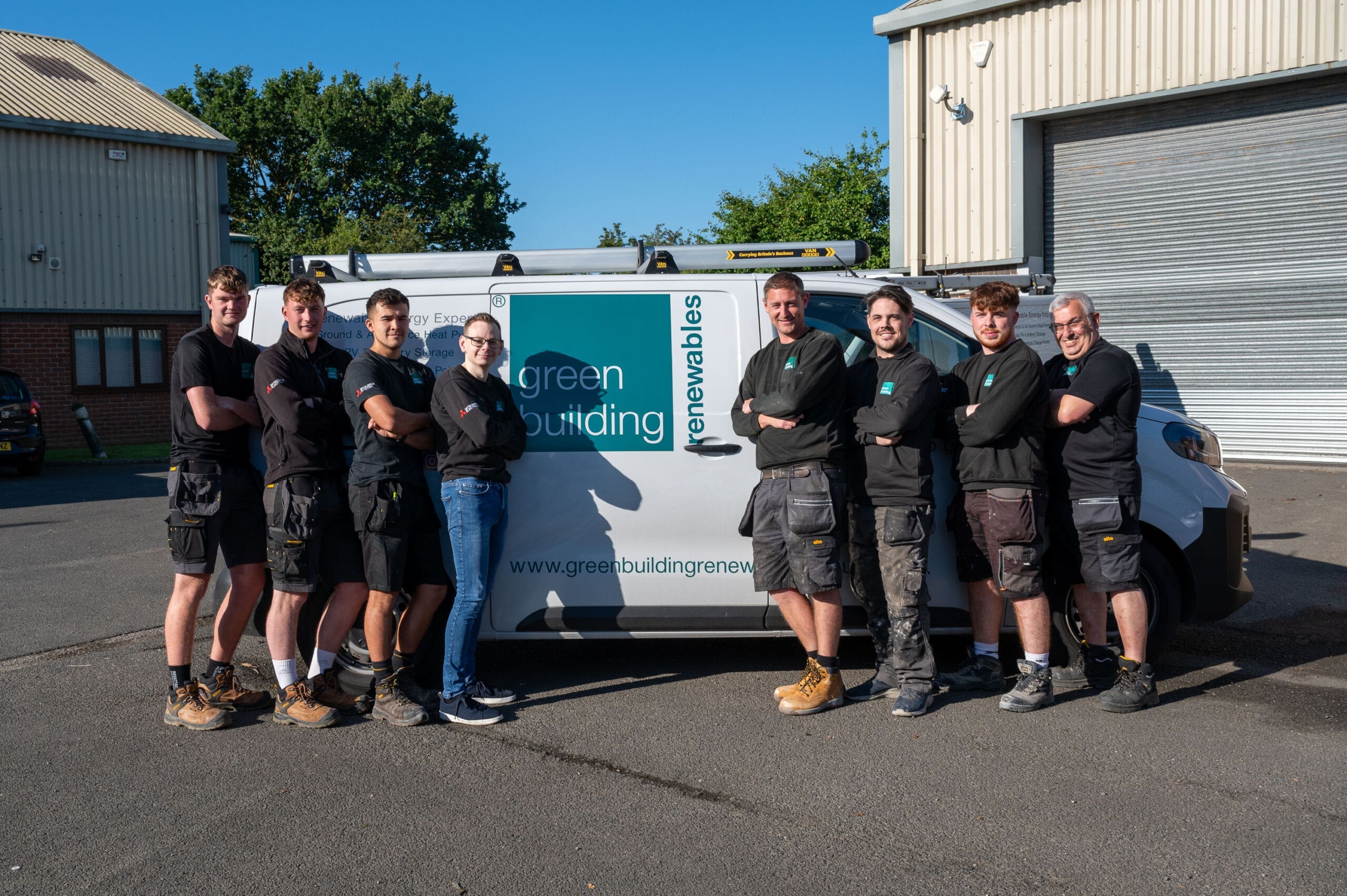Heat pump FAQs

FAQs about heat pumps
Why heat pumps?
As the National Grid is increasingly generating with renewable energy, heat pumps can offer an energy efficient and low carbon method of heating your home.
Heat pumps also often work well with solar PV and battery storage, enabling greater energy independence and helping future-proof homes.
As well as reducing carbon emissions, heat pumps can also potentially offer a cheaper form of energy for homes in rural areas that are off the mains gas grid and rely on stored oil or LPG for heating.
Ground or air source?
There are two main types of heat pumps available:
Ground source heat pumps (GSHP) rely on absorbing the heat from under the ground using cables buried 1 metre underground in 100 – 200metre lengths. GHSPs are more efficient and have a greater CoP than ASHP systems as the temperature of the ground is fairly constant. However, GSHPs do require a large outside space for all the pipework, the equivalent of half a football pitch. Typical system costs: £20-25K
Air source heat pumps (ASHP) involve a small-sized ASHP unit being located outside close to the building. ASHPs are not as efficient as GSHPs in terms of converting electricity to heat but are about half the price and do not require a huge amount of outdoor space. Typical system costs: £10-12K.
How do heat pumps work?
Air source and ground source heat pumps absorb heat from the outside ground or air and convert that into heat and hot water for your home. Heat pumps use reverse refrigeration technology to deliver an energy ‘multiplier effect’.
Energy is transferred from the ambient air making use of the phase change properties of the refrigerant within the heat pump unit. Energy is captured outside as the refrigerant evaporates into a gas and is then released inside when the gas condenses to liquid. This fluid passes through a compressor, concentrating the heat and increasing the temperature, before transferring the higher temperature heat to the heating and hot water circuits of the house.
Although air source heat pumps need electricity to run, the heat output is greater than the electricity input, making heat pumps an energy efficient and low carbon method of heating your home.
The efficiency of how the heat pump converts electricity to heat using the refrigeration process is called the Coefficient of Performance (CoP). For example, if a heat pump system has a CoP of 3, then for every 1kWh of electricity used to run the system you will potentially get 3kWh of energy for heating. Typical CoPs for air source heat pumps (ASHPs) are around 3.5 and for ground source heat pump (GSHPs) CoPs are around 4.5.
What are the running costs for heat pumps?
At present, the running costs of a heat pump are roughly on a par with heating your home with mains gas. However, if you are ‘off grid’ and replacing LPG or oil-fired heating, heat pumps are almost always cheaper to run.
Heat pumps aren’t always suitable for every property. For a larger uninsulated property, the heating demand could be so high in winter that the lower temperature heat pump system would needs unfeasibly large radiators to keep the space warm. In such a case, we would recommend insulation and airtightness measures before installing a heat pump.
What financial support is available?
The Government‘s Renewable Heat Incentive (RHI) scheme is due to end on 31 March 2022. It works by making payments to householders over a number of years ranging from between £6,000 – £11,000, depending on the amount of renewable heat provided by the heat pump that has been installed.
The RHI will be replaced by a new Government grant scheme starting in April 2022 which offers homeowners upfront payments of £5000 for ASHPs and £6000 for GSHPs. The grant will not cover all heat pump installation costs and customers will be expected to pay the balance.
Do heat pumps work at cold temperatures?
All home heating systems work best in homes which are well-insulated but this is definitely the case for heat pumps, which provide a steady, gentle source of heat to maintain an even temperature, instead of the blast of fossil fuels that draughty buildings require to warm up. Heat pumps tend to run continuously to top up the heating to an even temperature, similar to the way that a fridge steadily keeps things cool.
Heat pumps can extract heat even when external air temperatures are as low as -20°C. However, the heat pump’s Coefficient of Performance (COP – which measures their conversion rate of electricity to heat) will reduce as external temperatures go down. For example, if it is 10 degrees outside the coefficient of performance might be 3.5 to 1 but if it is minus 10 degrees it might be 2.5 to 1.
Careful modelling for heat pump performance all year round
All MCS-accredited heat pump installers in the UK use a design specification called MIS3005. The efficiency of heat pumps is modelled alongside seasonal performance factors (SPFs) to give you an idea of how it will perform in climatic conditions across the year.
The MIS3005 specification requires that a heat pump system is able to cover the heat load of that building for 99% of the year’s seasonal fluctuations. This means that there will be 1% of the time where the heating load will not match the external temperatures. However, if you were to design a heat pump to cover 100% of the year, you’d be massively over-specifying the system just to cover that really small freak eventuality where it is abnormally cold. It is also worth pointing out that most people’s houses in the UK wouldn’t get warm on those extremely cold days.
It is a fine balance in making sure the system does perform as required for the vast majority of the time while also having a cost-effective system that is not over-specified.
How do you get the right-sized heat pump for your home?
Our design team would carefully undertake room-by-room heat loss calculations of your home to understand the heat pump kW heating load and radiator sizes that you require. We do this by measuring floor area and radiators in the existing building or on your architectural designs. This is a vital part of your heat pump system specification.
We recently had a customer who had had quotes from other companies for a 7kW heat pump but after we had done the detailed heat loss calculations for the project, we suggested that an 11kW ASHP would be more suitable, alongside some building fabric improvements.
If you do not have detailed heat loss calculations undertaken there is a danger that you will be specified a heat pump that cannot cope with the heating load of your home during very cold periods.
What happens if my heat pump breaks down?
Like domestic fridges, which use very similar technology, heat pumps are rarely faulty. However, good design and installation is important to ensure the optimal performance of heat pumps.
In the unlikely event that your heat pump does break down, we have a network of regional installers to provide quick and attentive aftersales care.
Are hybrid heat pump/ gas boilers a good idea?
We are not huge fans of hybrid heat pumps/gas boilers. We feel that our customers are better off just opting for a single heating source. In our view, the vast majority of homes in the UK can be more than adequately heated by a heat pump and would not need a gas boiler back up. If well designed and installed, heat pumps can definitely supply all the heat needed for a home
The notion that there is a need for back-up gas boiler sends out the wrong message to consumers and suggests that heat pumps on their own cannot provide sufficient heat. With the right design and advice and thorough heat loss calculations heat pumps should be more than adequate.
There is also no need to have the boiler element as a back-up if the ASHP breaks down, just as a spare gas boiler would not be needed for an ordinary gas boiler. In the rare event that an ASHP breaks we’ll send an engineer out, as would happen if a gas boiler had broken down.
When are heat pumps not suitable?
Not all buildings in the UK will be suitable for a heat pump. Heat pumps can deliver up to 22KW of heat load. For larger, older houses with no insulation there may be situations where a heat pump can’t meet the needs of the building. In older uninsulated properties upgrading and upsizing the radiators is going to be expensive and the radiators would need to be so large they would end up taking up half the room!
If the heat demand for a home is too high for a heat pump technology and has a heat load of more than 22KW then we would be strongly urging customers to go down the fabric first, energy efficient route first or else choose a different heating source.
We pride ourselves on giving honest advice as the suitability of heat pumps for your home and we wouldn’t encourage their use if we do not think they are appropriate for your situation. The key question is always: is it going to provide you with enough heat?
Can you have two heat pumps?
In a few situations, two heat pumps might offer a suitable solution. We can design a two heat pump system that works well together and covers the heating load either by splitting/ zoning the pumps or cascading them.
Where to locate the heat pump and hot water cylinder?
When we are designing heat pumps for existing buildings the location of the heat pump units and hot water cylinders is one of our biggest challenges. We almost always manage to find a solution but this is a key part of our heat pump design service.



